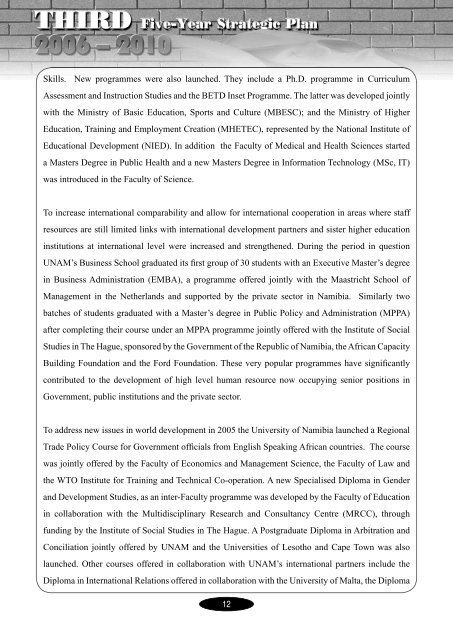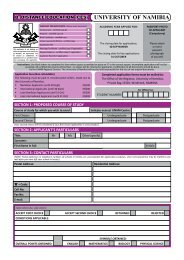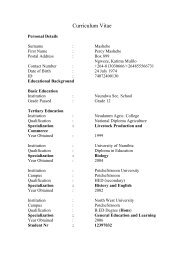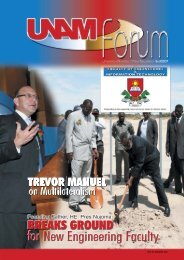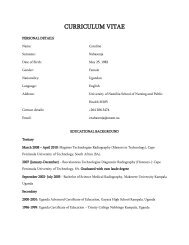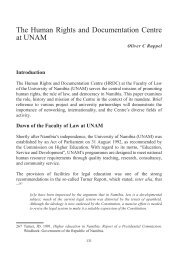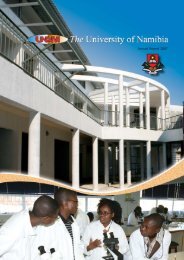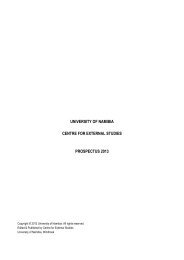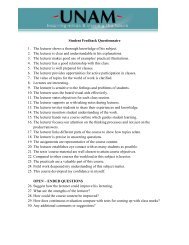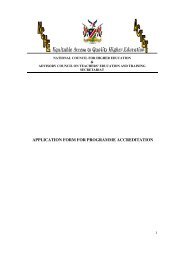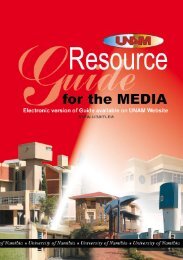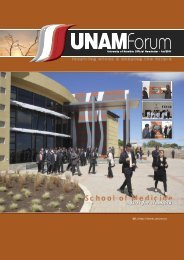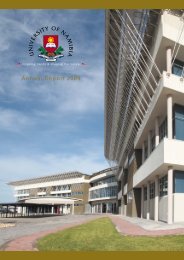5Year Strategic Plan - University of Namibia
5Year Strategic Plan - University of Namibia
5Year Strategic Plan - University of Namibia
You also want an ePaper? Increase the reach of your titles
YUMPU automatically turns print PDFs into web optimized ePapers that Google loves.
Skills. New programmes were also launched. They include a Ph.D. programme in Curriculum<br />
Assessment and Instruction Studies and the BETD Inset Programme. The latter was developed jointly<br />
with the Ministry <strong>of</strong> Basic Education, Sports and Culture (MBESC); and the Ministry <strong>of</strong> Higher<br />
Education, Training and Employment Creation (MHETEC), represented by the National Institute <strong>of</strong><br />
Educational Development (NIED). In addition the Faculty <strong>of</strong> Medical and Health Sciences started<br />
a Masters Degree in Public Health and a new Masters Degree in Information Technology (MSc, IT)<br />
was introduced in the Faculty <strong>of</strong> Science.<br />
To increase international comparability and allow for international cooperation in areas where staff<br />
resources are still limited links with international development partners and sister higher education<br />
institutions at international level were increased and strengthened. During the period in question<br />
UNAM’s Business School graduated its first group <strong>of</strong> 30 students with an Executive Master’s degree<br />
in Business Administration (EMBA), a programme <strong>of</strong>fered jointly with the Maastricht School <strong>of</strong><br />
Management in the Netherlands and supported by the private sector in <strong>Namibia</strong>. Similarly two<br />
batches <strong>of</strong> students graduated with a Master’s degree in Public Policy and Administration (MPPA)<br />
after completing their course under an MPPA programme jointly <strong>of</strong>fered with the Institute <strong>of</strong> Social<br />
Studies in The Hague, sponsored by the Government <strong>of</strong> the Republic <strong>of</strong> <strong>Namibia</strong>, the African Capacity<br />
Building Foundation and the Ford Foundation. These very popular programmes have significantly<br />
contributed to the development <strong>of</strong> high level human resource now occupying senior positions in<br />
Government, public institutions and the private sector.<br />
To address new issues in world development in 2005 the <strong>University</strong> <strong>of</strong> <strong>Namibia</strong> launched a Regional<br />
Trade Policy Course for Government <strong>of</strong>ficials from English Speaking African countries. The course<br />
was jointly <strong>of</strong>fered by the Faculty <strong>of</strong> Economics and Management Science, the Faculty <strong>of</strong> Law and<br />
the WTO Institute for Training and Technical Co-operation. A new Specialised Diploma in Gender<br />
and Development Studies, as an inter-Faculty programme was developed by the Faculty <strong>of</strong> Education<br />
in collaboration with the Multidisciplinary Research and Consultancy Centre (MRCC), through<br />
funding by the Institute <strong>of</strong> Social Studies in The Hague. A Postgraduate Diploma in Arbitration and<br />
Conciliation jointly <strong>of</strong>fered by UNAM and the Universities <strong>of</strong> Lesotho and Cape Town was also<br />
launched. Other courses <strong>of</strong>fered in collaboration with UNAM’s international partners include the<br />
Diploma in International Relations <strong>of</strong>fered in collaboration with the <strong>University</strong> <strong>of</strong> Malta, the Diploma<br />
12


